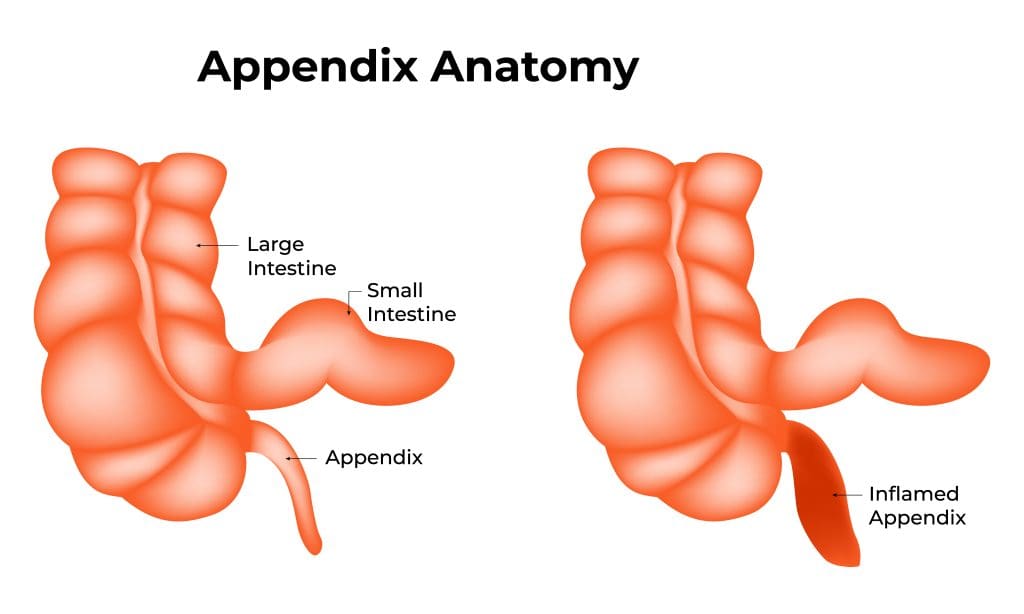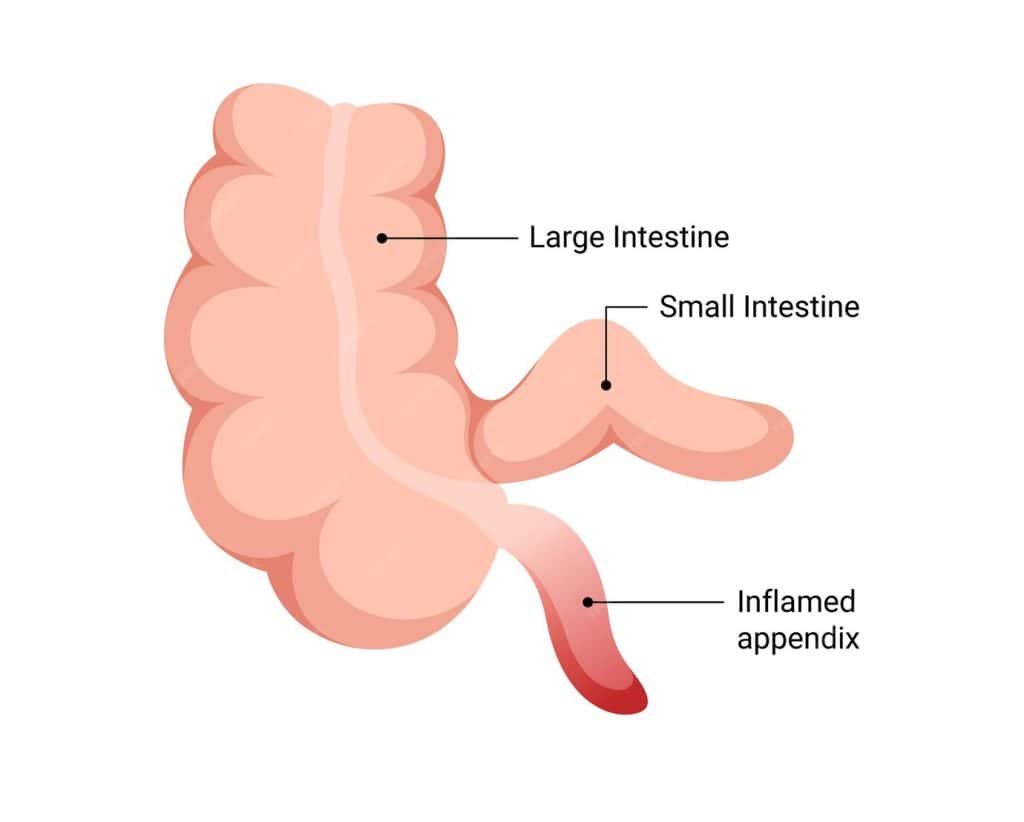Introduction: Appendicitis and why you should care
We believe that no one expects to have appendicitis, but when it happens, quick action needs to be taken. It is ranked among the major causes of emergency surgery, but it can affect anyone, although it occurs most often in young people. In this blog, we will give you an overview of appendicitis, the associated risks, and the available appendicitis treatments that we hope will help you feel more in control should you find yourself experiencing this condition.
What is Appendicitis?
Appendicitis is an inflammation of the appendix, which is a small tubular or finger-like structure attached to the large intestine. I believe you may ask a frequently asked question as, “If the appendix is not vital, then why does it cause lots of issues?” The situation becomes even worse when it becomes blocked or infected; one gets severe pains and swelling and may even burst.
Symptoms
Almost everyone undergoes a sharp sting that starts in the region of the umbilicus and moves to the lower right quadrant. However, appendicitis also has these symptoms: feeling sick, having no appetite, and a fever. Identifying such early changes is important since the disease rapidly progresses with possible appendix rupture and severe consequences.
Types of Appendicitis: From Mild to Severe
The condition known as appendicitis is not a homogenous condition. Let’s break down the types:
- Acute Appendicitis: This is by far the most prevalent, in which the appendix is extremely swollen and surgery is necessary to avoid burst.
- Chronic Appendicitis: It is less frequent, has more subtle symptoms that may be intermittent, and is therefore difficult to diagnose.
Symptoms that you should never ignore are any consistent or unexplained discomfort in the abdominal area because time is a critical factor when it comes to the treatment of ailments.


What causes Appendicitis?
Septicaemia, trauma, and barotrauma don’t cause appendicitis, but they are recognised risk factors. These include:
- Fecaliths (hardened stool): The most frequent type, in which sometimes even tiny pieces of feces interfere with the appendix.
- Infections: Inflammation of the appendix can be triggered by infections within the gastrointestinal system or in other parts of the body.
- Foreign objects or tumors: It is also important to note that, although not very common, an object or tumor may lump up in the appendix, hence causing appendicitis.
Knowledge of these causes sharpens your awareness of the potential dangers, particularly where some members are categorized as high-risk.
Stages of Appendicitis: How it progresses
Appendicitis doesn’t wait. But it progresses rapidly from discomfort to potentially deadly complications. Here’s a snapshot of its progression:
- Early Inflammation: Symptoms are weak initial pain sensations that escalate over time.
- Suppurative Appendix: It more or less localizes in the RLQ as a sharp pain that is almost intolerable and radiates to the groin. This is followed by other symptoms such as fever, nausea, and vomiting.
- Gangrenous Appendix: Appendix blood circulation is cut off, thereby requiring surgery to avoid rupture if the appendix is blocked.
- Perforated Appendix: The appendix bursts, and the stuff from the appendix goes to the lower abdomen and causes peritonitis, which is an infection.
If they are diagnosed early, appendicitis can be treated using surgery; however, if one is diagnosed late, they can get into these severe stages and have a much more difficult time in healing.
Consequences for untreated Appendicitis
If appendicitis isn’t treated quickly, complications can arise, such as:
- Abscess formation: infection that needs to be drained and that affects only a small area.
- Peritonitis: A serious infection of the abdominal wall, where cellulitis may develop if the appendix ruptures.
- Sepsis: A severe invasive infection that may affect several parts of the body.
The best thing about these complications is that they can be prevented if the doctor intervenes at the right time. However, never underestimate the symptoms; if you think it is appendicitis, then do not hesitate to go see a doctor.
How are appendicits diagnosed?
If you suspect appendicitis, here’s what you can expect when visiting a healthcare provider:
- Physical exam: A doctor will look for pain in the lower right abdomen or examine the patient’s tenderness in relation to rebound pain.
- Blood tests: Leukocytosis implies infection in many clinical settings.
- Imaging tests: X-rays or ultrasounds may, however, be used to check the appendix, if it is swollen or compressed in the abdomen.
These steps are important in a way that they give a good picture to the doctors on the particular condition before they can embark on the next step that they should take.
Plans for Appendicitis Treatment
What is worse is that once one is diagnosed, treatment cannot be delayed as it is with other diseases. The conventional therapy is an appendectomy, which involves surgical removal of the appendix. However, the approach to achieving this can differ depending on the conditions of the case.
- Antibiotics first: In such little signs of infection, the client is given antibiotics to minimize infection before surgery. Occasionally, especially when the condition is extremely mild, only antibiotics may be sufficient.
- Appendectomy: The benchmark for most scenarios for this surgery can be open surgery or a laparoscopic surgery, where only small incisions are made to heal quickly.
- Abscess drainage: If the appendix has formed an abscess, the patient may require drainage before going through the operation.
What to expect after surgery
Appendix surgery healing time may differ because of the nature of the appendix incision and the intensity of the sickness. Again, most can be discharged within the next few days, even after laparoscopic surgery. After the surgery is complete, there are some basic prohibitions on lifting heavy objects and certain forms of movement for two to four weeks after the surgical intervention.


The Road to Recovery: What to expect
Appendicitis surgery recovery is usually uneventful and patients should avoid exerting themselves too much. You will need to manage pain after the surgery and you’ll be on a soft diet for a few days following the surgery. Comply strictly with your doctor’s advice in order not to experience any problems related to healing.
- IV fluids and pain management: Taking good care of the bodily fluid balance and pain in the hospital is one of the most important.
- Post-surgery care: Most of the patients are up and about and going back to their normal activities within a week to a few weeks, but it’s important to take it easy.
Among the important questions answered by the doctor are: when to call the doctor after surgery. Most recoveries are straightforward, but if you experience any of the following, call your doctor:
- Chronic pain that is unrelieved
- High fever
- Persistent vomiting
Other signs found by palpation are warmth, thickness or redness, and/or presence of a discharge at the operation area.
These symptoms might show that the individual has developed an infection or some other complication and that is why signs of monitoring must always be taken.
Conclusion: Don’t ignore the signs
One cannot prevent appendicitis; however, one can treat it—especially if this condition is diagnosed at the beginning stages. Any time that one is not quite sure of the causes of the abdominal pain, he or she should go look for medical assistance immediately. Here in Surgikure, our professional doctors are ready to attend to your needs and specifically regarding appendicitis, our services will avail themselves in the shortest time possible for any emergency.
FAQs
- What are the first symptoms of appendicitis?
It can be difficult to differentiate from other forms of sickness at first for some people—they can have pain in the area near the navel but then it will move down to the lower right side of your tummy,it will make you feel uneasy and give you a low-grade temperature. You should therefore consult a doctor immediately if you develop any of the above symptoms.
- Is it possible to treat appendicitis without having surgery?
Often antibiotics are given in cases of acute appendicitis even though appendectomy is the standard and effective treatment once appendicitis has progressed to the stage where the appendix may burst.
- How long after an appendectomy is the recovery time?
Recovery period largely depends on the kind of surgery performed—an open surgery or a minimal access surgery such as laparoscopic surgery. Patients are usually given a prescription for pain medication, which allows most patients to resume normal activities in 2-4 weeks, but they should avoid heavy activities for at least 4-6 weeks.
- What happens if the appendix is left untreated?
Appendicitis can also lead to a burst appendix, peritonitis, infection of the thin tissue layer separating the outer and inner layers of the abdomen, and septicemia. Each of these complications is potentially fatal.
- How frequent is appendicitis in children?
Yes, appendicitis is rather frequent in children, especially those in the age of 10 to 20 years old. Parents and caretakers should ensure that a child gets medical attention once he or she experiences stomach pain that gets worse over time.
